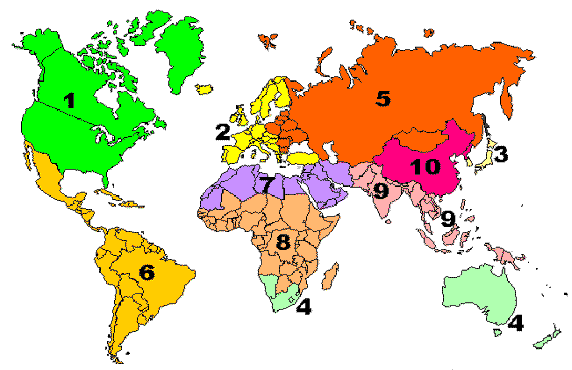| The Club Of Rome Founded in 1968, the Club of Rome is a global think tank that deals with a variety of international political issues. According to its website, the Club of Rome is composed of "scientists, economists, businessmen, international high civil servants, heads of state and former heads of state from all five continents who are convinced that the future of humankind is not determined once and for all and that each human being can contribute to the improvement of our societies."  The Ten Kingdoms - The ten regions originated with the Club of Rome “think tank”, and was established by the United Nations. The Club of Rome was given the task of uniting Europe, and dividing the world into manageable blocks. Here's a map of the world, divided into the ten economic regions, which the United Nations and the Club of Rome call “The Ten Kingdoms”. From Gary Kah’s En Route to Global Occupation, page 40: “The Club of Rome had its beginnings in April of 1968…The Club of Rome has been charged with the task of overseeing the regionalization and unification of the entire world; the Club could therefore be said to be one step above the Bilderbergers in the one world hierarchy…On September 13, 1973, the Club released one such report entitled “Regionalized and Adaptive Model of the Global World System”…The document reveals that the Club has divided the world into ten political/economic regions, which it refers to as “kingdoms”. As the ten kingdoms/regions come together even more in preparation for the reign of the world ruler, we will see the regionalizing of money, then a globalization of monetary exchange or the “cashless society”. (Revelation 13) Regarding the world and its division into economic regions: Here are the countries for each region: Since this map was drawn in 1973, the first region also includes Mexico. 1. NAFTA (America, Canada and Mexico) 2. The E.U. – countries of the European Union, Western Europe as a whole 3. Japan 4. Australia, New Zealand, South Africa 5. Eastern Europe, Pakistan, Afghanistan, Russia and the former countries of the Soviet Union 6. Central and South America, Cuba and Caribbean Islands 7. The Middle East and North Africa 8. The rest of Africa, except South Africa 9. South and Southeast Asia, including India 10. China (Mongolia is now included with China) The islands of the seas, for the most part, fit in with the closest region. |